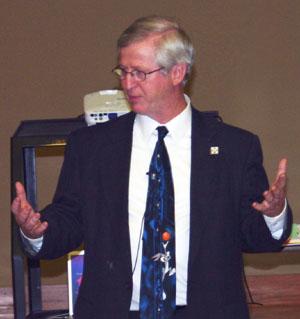
By Celine Klosterman
SOLON — Parents are the most important influence on teenagers’ spiritual lives, according to the National Study of Youth and Religion (NSYR) conducted from 2001-05.
An Oct. 28-29 event sponsored by the Diocese of Davenport aimed to help Catholics realize that truth and offered strategies for strengthening families’ faith. About 100 parents and catechists gathered at St. Mary Parish in Solon Oct. 28 for “Strong Catholic Families: Strong Catholic Youth,” a National Federation for Catholic Youth Ministry program led by Greg “Dobie” Moser, director of youth and young adult ministry in the Diocese of Cleveland, Ohio.
Most teens don’t rebel against or shrug off their parents’ faith, but follow it, according to research Moser presented. Statistics he shared revealed that the percentage of youths who attend Mass weekly is similar to the percentage of adults who attend Mass weekly.
Youths who practice their faith tend to be happier, serve more often in their community and engage in fewer high-risk behaviors than other teenagers, research shows. Church programs and activities offer support and foster relationships, Moser explained.
Yet when it comes to reading Scripture, praying alone, attending retreats and religious services and practicing faith in other ways, Catholic teens rank behind Mormons and conservative, black and mainline Protestant groups, according to the NSYR. Jewish and non-religious teens ranked behind Catholics.
For many youths, specific religious activities hold little importance. The NSYR found that a non-demanding, individualistic “moralistic therapeutic deism” is a common approach to faith today. Moser said this “feel-good” view holds that God watches from a distance, wants people to be “nice” and “good,” and that life’s goal is to be happy. The perspective lacks a communal dimension and an emphasis on justice, service and sacrament.
Moser quoted author and professor R. Scott Appleby, who stressed introducing young Catholics to Catholicism as a “comprehensive way of life.” The Solon presentation offered suggestions for families to live out that faith, including:
• sharing “cross moments,” recent times that family members felt God’s presence,
• making moments of family forgiveness and reconciliation visible,
• making rituals of family prayer,
• reading and praying with Scripture at home,
• ministering at a parish together, and
• serving in the community together.
Moser also encouraged parents to simply spend time with and listen to their teenagers. On average, parents spend less than three minutes a day engaged with their children in “non-directive communication” — communication other than, for example, issuing orders or asking whether a child finished a homework assignment.
In a study, youths revealed they wanted to be closer to their parents, but didn’t know how. Moser observed that modern families’ schedules are often packed, but cited research showing that most teenagers and parents would give up a weeknight activity to have dinner as a family.
“Parents are looking for support and information like this,” said Molly Boch, a member of St. Mary Parish, after the presentation. “This really hits home for people who are trying to raise a Catholic family.”
Connie Goldsmith said that over the years, she’s noticed more disinterest in faith among teens, partly because of their home environment. “It seems like we have our work cut out for us,” said the catechist at St. Thomas More Parish in Coralville.
Linda Gent, youth minister at St. James Parish in Washington, said all parents should attend presentations such as “Strong Catholic Families: Strong Catholic Youth.” She attended the Oct. 28 session and was one of about 30 Catholics who participated Oct. 29, when Moser explained the benefits of the program and taught catechists how to train parents in forming youths’ faith.
“The information families can get is invaluable,” Gent said. “If they realized how much Catholic teens follow their parents’ faith practices, parents would put more thought into how they’re presenting faith to their teens.”








